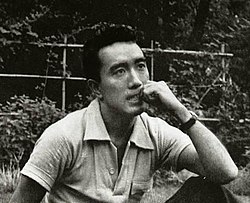Yukio Mishima
| Yukio Mishima | |
|---|---|

Mishima in 1956
|
|
| Born | Kimitake Hiraoka January 14, 1925 Shinjuku, Tokyo, Japan |
| Died | November 25, 1970 (aged 45) Ichigaya, Tokyo, Japan |
| Pen name | Yukio Mishima |
| Occupation |
|
| Nationality | Japanese |
| Alma mater | University of Tokyo |
| Period | 1941–1970 |
| Spouse | Yoko Sugiyama (m. 1958) |
| Children |
|
Yukio Mishima (三島 由紀夫 Mishima Yukio?) is the pen name of Kimitake Hiraoka (平岡 公威 Hiraoka Kimitake?, January 14, 1925 – November 25, 1970), a Japanese author, poet, playwright, actor, and film director. Mishima is considered one of the most important Japanese authors of the 20th century. He was considered for the Nobel Prize in Literature in 1968 but the award went to his countryman Yasunari Kawabata. His works include the novels Confessions of a Mask and The Temple of the Golden Pavilion, and the autobiographical essay Sun and Steel. His avant-garde work displayed a blending of modern and traditional aesthetics that broke cultural boundaries, with a focus on sexuality, death, and political change. Mishima was active as a nationalist and founded his own right-wing militia. He is remembered for his ritual suicide by seppuku after a failed coup d'état attempt, known as the "Mishima Incident".
The Mishima Prize was established in 1988 to honor his life and works.
Mishima was born in the Yotsuya district of Tokyo (now part of Shinjuku). His father was Azusa Hiraoka, a government official, and his mother, Shizue, was the daughter of the 5th principal of the Kaisei Academy. Shizue's father, Kenzō Hashi, was a scholar of Chinese classics, and the Hashi family had served the Maeda clan for generations in Kaga Domain. Mishima's paternal grandparents were Sadatarō Hiraoka and Natsuko (family register name: Natsu) Hiraoka. He had a younger sister, Mitsuko, who died of typhus in 1945 at the age of 17, and a younger brother, Chiyuki.
...
Wikipedia
